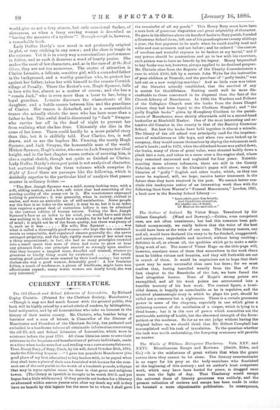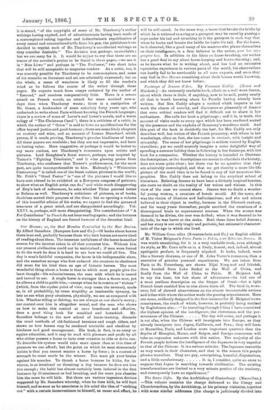The Works of William Nakepeace Thackeray. Vole. XXV. and XXVI.
Miscellaneous Essays and Reviewa. (Smith, Elder, and Co.) —It is the misfortune of great writers that when the grave covers them they cannot be let alone. The literary resurrectionist is as eager for his prey as the body-snatchers who flourished at the beginning of this century ; and an author's least competent work, which may have been buried for years, is dragged once more into the light of day. That Thackeray would escape the universal doom of literary greatness was unlikely, and the present collection of reviews and essays has been made in order to forestall a more objectionable publication. In consequence,
it is stated, "of the copyright of some of Mr. Thackeray's earlier writings having expired, and of advertisements having been made of a contemplated raking together and indiscriminate republication of every casual and unconsidered trifle from his pen, the publishers have decided to reprint such of Mr. Thackeray's uncollected writings as they consider desirable." The decision was, perhapQ, unavoidable ; but we are sorry for it. It would be unjust to say that there are no traces of the novelist's genius to be found in these pages,—we see it in "Miss Lowe" and perhaps in "The Professor," two short tales that will be still acceptable to magazine-readers. As a critic, too, it was scarcely possible for Thackeray to be commonplace, and some of his remarks on literature and art are admirably expressed ; but on the whole, a sense of weariness is likely to fill the reader's mind as he follows the course of the writer through these pages. He expects much from essays endorsed by the author of "Esmond," and receives comparatively little. There is a severe attack on French novels, an attack far more merited now.a. days than when Thackeray wrote ; there is a castigation of Mr. Grant, a bookmaker of some notoriety forty years ago, who undertook to write about Paris without knowing the French language ; there is a review of some of Lover's and Lever's novels, and a warm eulogy of "The Christmas Carol "; there is a criticism of a critic, in which the author of " Orion " is said to have no qualifications for the office beyond justice and good-humour ; there are some lively chapters on cookery and wine, and an account of Leman Blanchard, which proves, if it needs proving, Thackeray's genuine kindliness of heart. All these papers are readable ; but they are not impressive, and have no lasting value. More suggestive, or perhaps it would be better to say more curious, are Thackeray's comments upon artists and pictures. Lord Houghton's finest sonnet, perhaps, was inspired by Turner's "Fighting Temeraire," and it wins glowing praise from Thackeray, who confesses that Turner's performances, for the most part, are quite incomprehensible to him. Malready's " Whistonian Controversy" is called one of the finest cabinet pictures in the world ; Mr. Frith's "Good Pastor" is "one of the, pictures I would like to have sent abroad to be exhibited at a European congress of painters, to show what an English artist can do ;" and while much disapproving of Etty's lack of refinement, he asks whether Titian painted better or Rubens as well. Thackeray's criticisms of pictures, as of books, doubtless served their purpose at the time ; but on opening a volume of this beautiful edition of his works, we expect to find the garnered treasures of a great mind, and are disappointed accordingly. Vol. XXVI. is, perhaps, still more disappointing. The contributions of "A Fat Contributor" to Punch do not bear reading again ; and the lectures on the history of England are forced humour of the dreariest kind.



































 Previous page
Previous page